Ethical, Privacy, and Security Implications for NGO Clients: MySupport
VerifiedAdded on 2023/06/04
|12
|3279
|167
Essay
AI Summary
This assignment explores the ethical, privacy, and security implications for clients of Non-Governmental Organizations (NGOs) that have adopted the MySupport approach, particularly focusing on the creation and use of digital IDs for accessing government support services. The essay analyzes the importance of privacy, defining it as the right to be left alone and protection from external threats like data manipulation and theft. It discusses how privacy expectations vary in different contexts, emphasizing the significance of informed consent in data handling. The assignment delves into the impact of information technology and surveillance on privacy, examining data surveillance and its implications. Furthermore, it addresses the personal and ethical implications of information security, covering data confidentiality, integrity, and availability, and how breaches can cause harm, including financial loss, emotional distress, and violations of rights such as freedom of information and speech. The essay also provides recommendations to protect clients' privacy and security, emphasizing the need for clear documentation, informed consent, and robust data protection measures. The assignment draws on academic sources and case studies to support the arguments and recommendations.
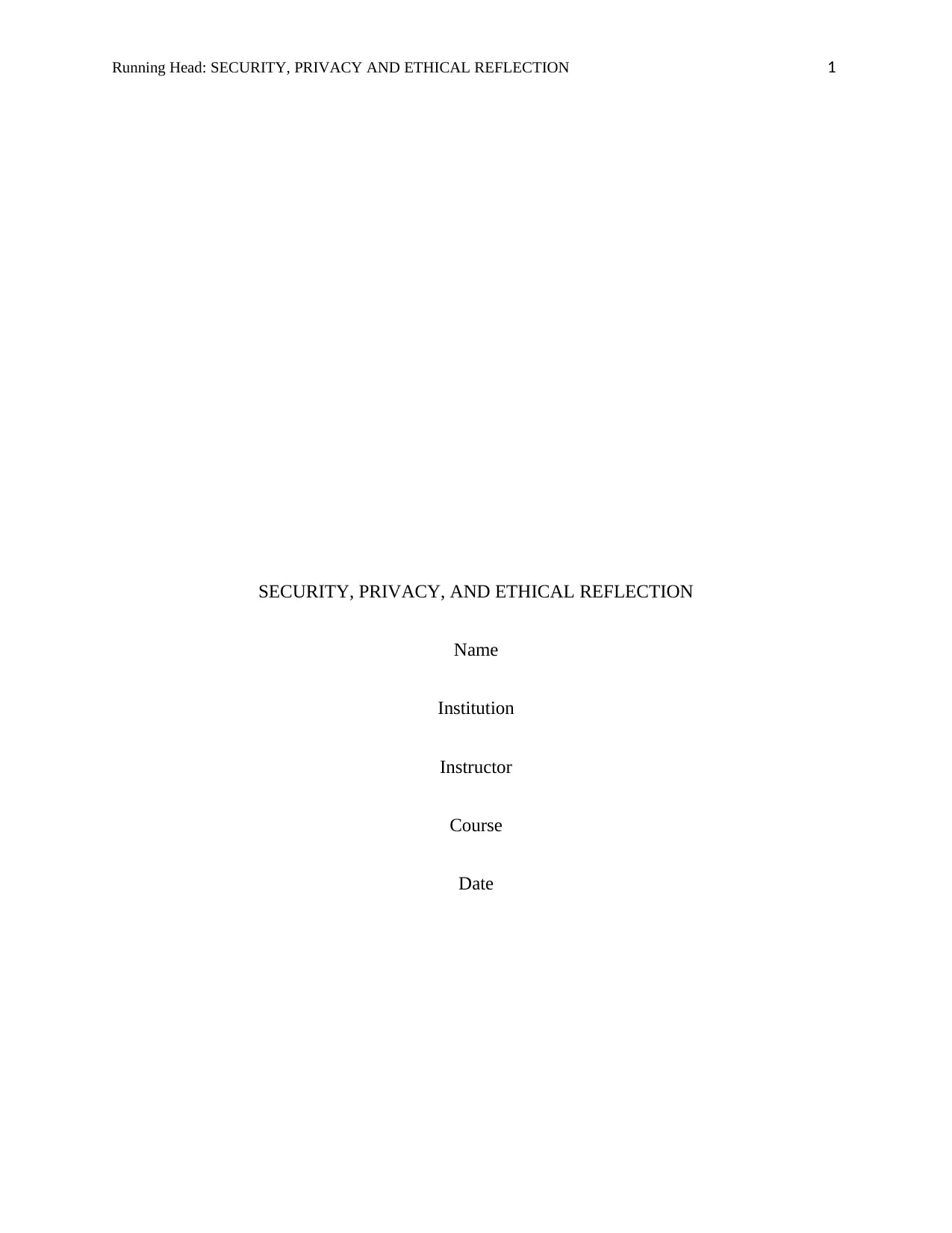
Running Head: SECURITY, PRIVACY AND ETHICAL REFLECTION 1
SECURITY, PRIVACY, AND ETHICAL REFLECTION
Name
Institution
Instructor
Course
Date
SECURITY, PRIVACY, AND ETHICAL REFLECTION
Name
Institution
Instructor
Course
Date
Paraphrase This Document
Need a fresh take? Get an instant paraphrase of this document with our AI Paraphraser
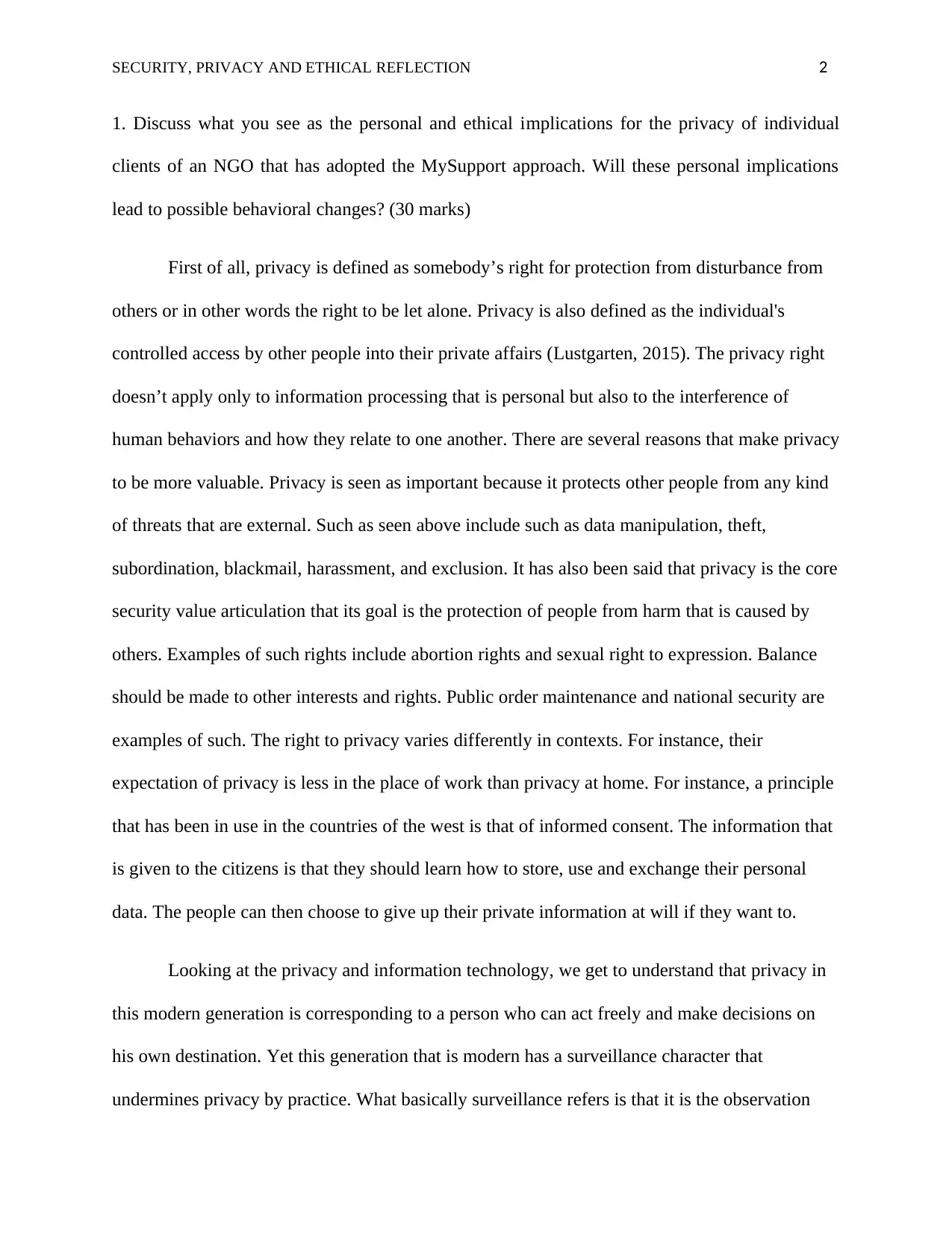
SECURITY, PRIVACY AND ETHICAL REFLECTION 2
1. Discuss what you see as the personal and ethical implications for the privacy of individual
clients of an NGO that has adopted the MySupport approach. Will these personal implications
lead to possible behavioral changes? (30 marks)
First of all, privacy is defined as somebody’s right for protection from disturbance from
others or in other words the right to be let alone. Privacy is also defined as the individual's
controlled access by other people into their private affairs (Lustgarten, 2015). The privacy right
doesn’t apply only to information processing that is personal but also to the interference of
human behaviors and how they relate to one another. There are several reasons that make privacy
to be more valuable. Privacy is seen as important because it protects other people from any kind
of threats that are external. Such as seen above include such as data manipulation, theft,
subordination, blackmail, harassment, and exclusion. It has also been said that privacy is the core
security value articulation that its goal is the protection of people from harm that is caused by
others. Examples of such rights include abortion rights and sexual right to expression. Balance
should be made to other interests and rights. Public order maintenance and national security are
examples of such. The right to privacy varies differently in contexts. For instance, their
expectation of privacy is less in the place of work than privacy at home. For instance, a principle
that has been in use in the countries of the west is that of informed consent. The information that
is given to the citizens is that they should learn how to store, use and exchange their personal
data. The people can then choose to give up their private information at will if they want to.
Looking at the privacy and information technology, we get to understand that privacy in
this modern generation is corresponding to a person who can act freely and make decisions on
his own destination. Yet this generation that is modern has a surveillance character that
undermines privacy by practice. What basically surveillance refers is that it is the observation
1. Discuss what you see as the personal and ethical implications for the privacy of individual
clients of an NGO that has adopted the MySupport approach. Will these personal implications
lead to possible behavioral changes? (30 marks)
First of all, privacy is defined as somebody’s right for protection from disturbance from
others or in other words the right to be let alone. Privacy is also defined as the individual's
controlled access by other people into their private affairs (Lustgarten, 2015). The privacy right
doesn’t apply only to information processing that is personal but also to the interference of
human behaviors and how they relate to one another. There are several reasons that make privacy
to be more valuable. Privacy is seen as important because it protects other people from any kind
of threats that are external. Such as seen above include such as data manipulation, theft,
subordination, blackmail, harassment, and exclusion. It has also been said that privacy is the core
security value articulation that its goal is the protection of people from harm that is caused by
others. Examples of such rights include abortion rights and sexual right to expression. Balance
should be made to other interests and rights. Public order maintenance and national security are
examples of such. The right to privacy varies differently in contexts. For instance, their
expectation of privacy is less in the place of work than privacy at home. For instance, a principle
that has been in use in the countries of the west is that of informed consent. The information that
is given to the citizens is that they should learn how to store, use and exchange their personal
data. The people can then choose to give up their private information at will if they want to.
Looking at the privacy and information technology, we get to understand that privacy in
this modern generation is corresponding to a person who can act freely and make decisions on
his own destination. Yet this generation that is modern has a surveillance character that
undermines privacy by practice. What basically surveillance refers is that it is the observation
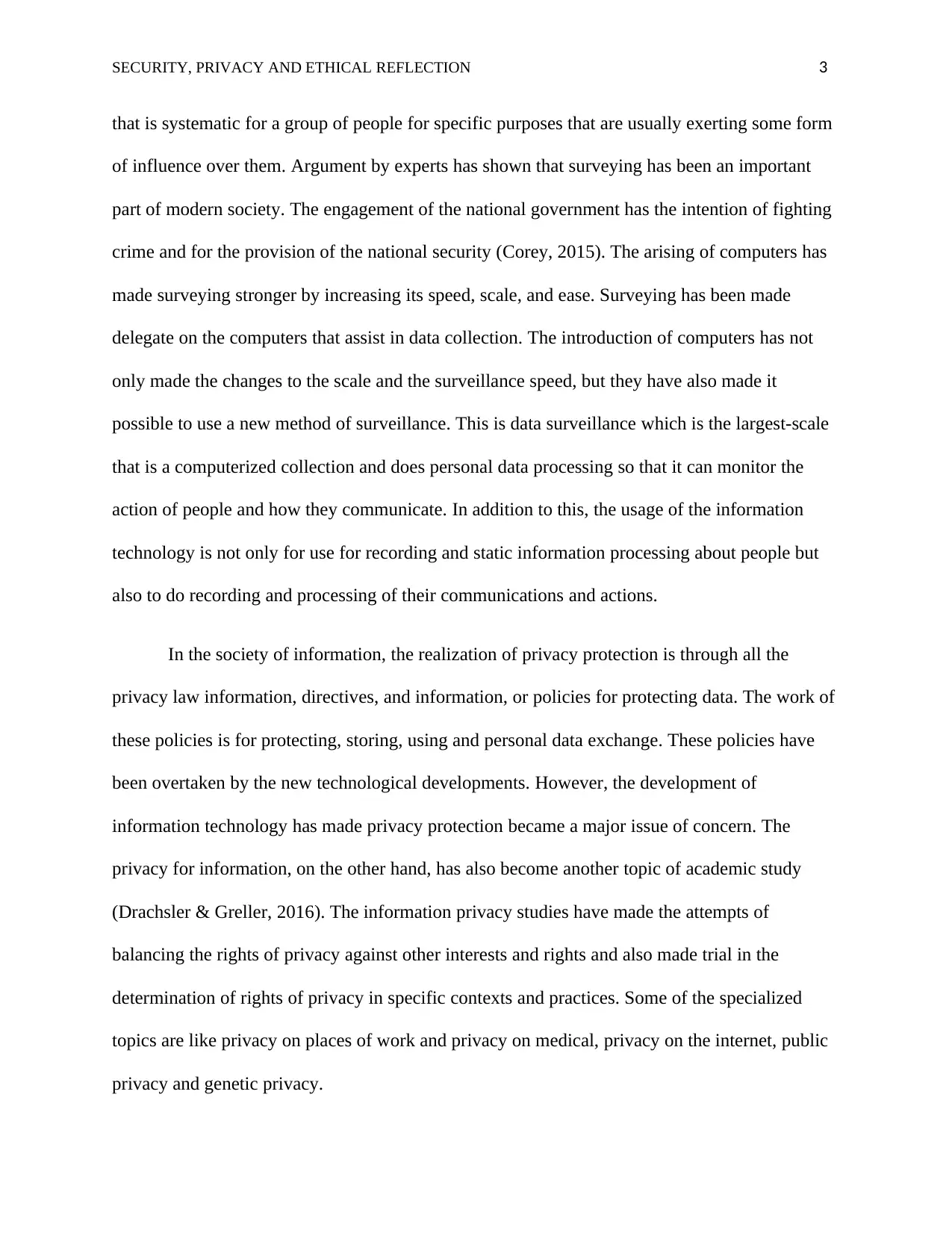
SECURITY, PRIVACY AND ETHICAL REFLECTION 3
that is systematic for a group of people for specific purposes that are usually exerting some form
of influence over them. Argument by experts has shown that surveying has been an important
part of modern society. The engagement of the national government has the intention of fighting
crime and for the provision of the national security (Corey, 2015). The arising of computers has
made surveying stronger by increasing its speed, scale, and ease. Surveying has been made
delegate on the computers that assist in data collection. The introduction of computers has not
only made the changes to the scale and the surveillance speed, but they have also made it
possible to use a new method of surveillance. This is data surveillance which is the largest-scale
that is a computerized collection and does personal data processing so that it can monitor the
action of people and how they communicate. In addition to this, the usage of the information
technology is not only for use for recording and static information processing about people but
also to do recording and processing of their communications and actions.
In the society of information, the realization of privacy protection is through all the
privacy law information, directives, and information, or policies for protecting data. The work of
these policies is for protecting, storing, using and personal data exchange. These policies have
been overtaken by the new technological developments. However, the development of
information technology has made privacy protection became a major issue of concern. The
privacy for information, on the other hand, has also become another topic of academic study
(Drachsler & Greller, 2016). The information privacy studies have made the attempts of
balancing the rights of privacy against other interests and rights and also made trial in the
determination of rights of privacy in specific contexts and practices. Some of the specialized
topics are like privacy on places of work and privacy on medical, privacy on the internet, public
privacy and genetic privacy.
that is systematic for a group of people for specific purposes that are usually exerting some form
of influence over them. Argument by experts has shown that surveying has been an important
part of modern society. The engagement of the national government has the intention of fighting
crime and for the provision of the national security (Corey, 2015). The arising of computers has
made surveying stronger by increasing its speed, scale, and ease. Surveying has been made
delegate on the computers that assist in data collection. The introduction of computers has not
only made the changes to the scale and the surveillance speed, but they have also made it
possible to use a new method of surveillance. This is data surveillance which is the largest-scale
that is a computerized collection and does personal data processing so that it can monitor the
action of people and how they communicate. In addition to this, the usage of the information
technology is not only for use for recording and static information processing about people but
also to do recording and processing of their communications and actions.
In the society of information, the realization of privacy protection is through all the
privacy law information, directives, and information, or policies for protecting data. The work of
these policies is for protecting, storing, using and personal data exchange. These policies have
been overtaken by the new technological developments. However, the development of
information technology has made privacy protection became a major issue of concern. The
privacy for information, on the other hand, has also become another topic of academic study
(Drachsler & Greller, 2016). The information privacy studies have made the attempts of
balancing the rights of privacy against other interests and rights and also made trial in the
determination of rights of privacy in specific contexts and practices. Some of the specialized
topics are like privacy on places of work and privacy on medical, privacy on the internet, public
privacy and genetic privacy.
⊘ This is a preview!⊘
Do you want full access?
Subscribe today to unlock all pages.

Trusted by 1+ million students worldwide
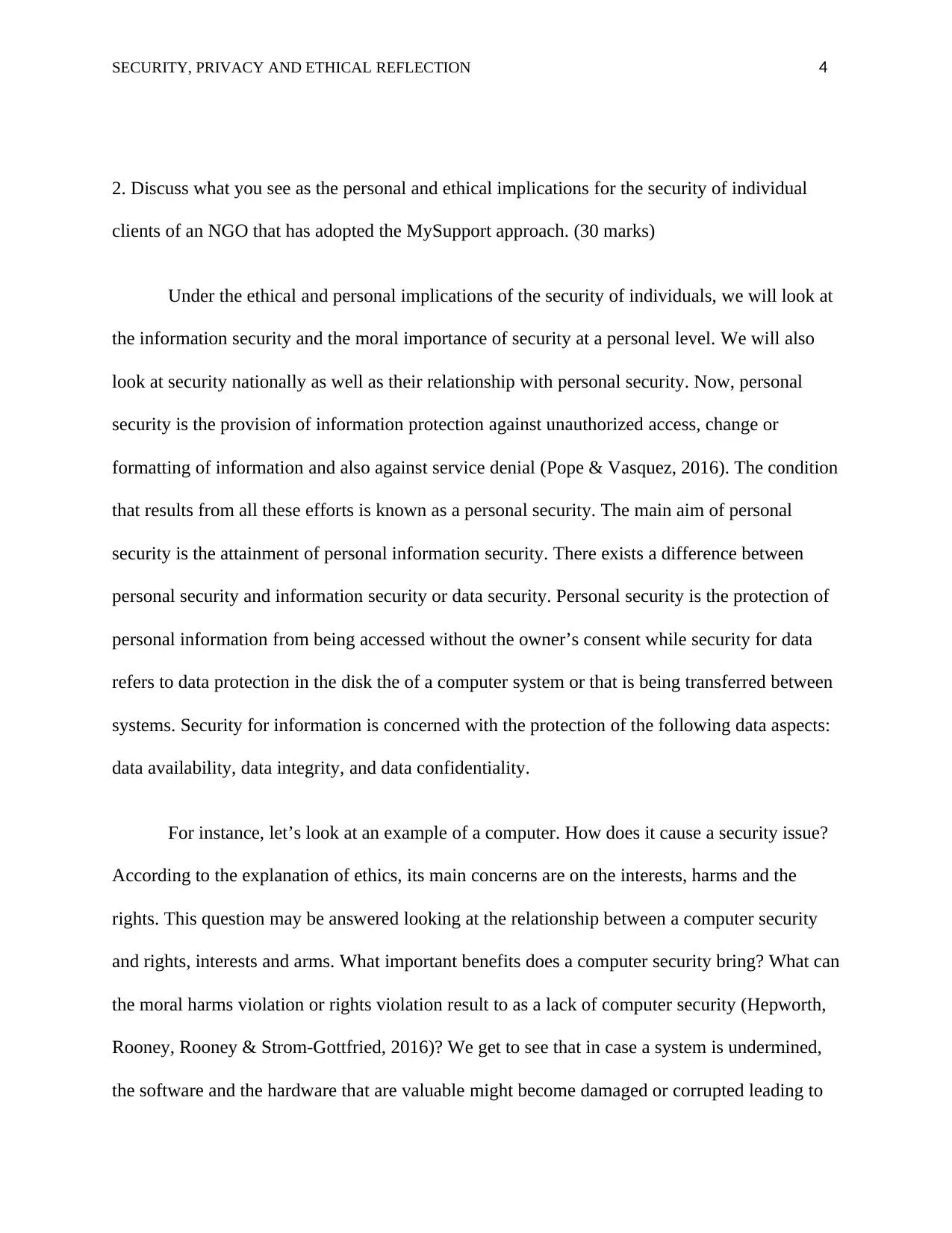
SECURITY, PRIVACY AND ETHICAL REFLECTION 4
2. Discuss what you see as the personal and ethical implications for the security of individual
clients of an NGO that has adopted the MySupport approach. (30 marks)
Under the ethical and personal implications of the security of individuals, we will look at
the information security and the moral importance of security at a personal level. We will also
look at security nationally as well as their relationship with personal security. Now, personal
security is the provision of information protection against unauthorized access, change or
formatting of information and also against service denial (Pope & Vasquez, 2016). The condition
that results from all these efforts is known as a personal security. The main aim of personal
security is the attainment of personal information security. There exists a difference between
personal security and information security or data security. Personal security is the protection of
personal information from being accessed without the owner’s consent while security for data
refers to data protection in the disk the of a computer system or that is being transferred between
systems. Security for information is concerned with the protection of the following data aspects:
data availability, data integrity, and data confidentiality.
For instance, let’s look at an example of a computer. How does it cause a security issue?
According to the explanation of ethics, its main concerns are on the interests, harms and the
rights. This question may be answered looking at the relationship between a computer security
and rights, interests and arms. What important benefits does a computer security bring? What can
the moral harms violation or rights violation result to as a lack of computer security (Hepworth,
Rooney, Rooney & Strom-Gottfried, 2016)? We get to see that in case a system is undermined,
the software and the hardware that are valuable might become damaged or corrupted leading to
2. Discuss what you see as the personal and ethical implications for the security of individual
clients of an NGO that has adopted the MySupport approach. (30 marks)
Under the ethical and personal implications of the security of individuals, we will look at
the information security and the moral importance of security at a personal level. We will also
look at security nationally as well as their relationship with personal security. Now, personal
security is the provision of information protection against unauthorized access, change or
formatting of information and also against service denial (Pope & Vasquez, 2016). The condition
that results from all these efforts is known as a personal security. The main aim of personal
security is the attainment of personal information security. There exists a difference between
personal security and information security or data security. Personal security is the protection of
personal information from being accessed without the owner’s consent while security for data
refers to data protection in the disk the of a computer system or that is being transferred between
systems. Security for information is concerned with the protection of the following data aspects:
data availability, data integrity, and data confidentiality.
For instance, let’s look at an example of a computer. How does it cause a security issue?
According to the explanation of ethics, its main concerns are on the interests, harms and the
rights. This question may be answered looking at the relationship between a computer security
and rights, interests and arms. What important benefits does a computer security bring? What can
the moral harms violation or rights violation result to as a lack of computer security (Hepworth,
Rooney, Rooney & Strom-Gottfried, 2016)? We get to see that in case a system is undermined,
the software and the hardware that are valuable might become damaged or corrupted leading to
Paraphrase This Document
Need a fresh take? Get an instant paraphrase of this document with our AI Paraphraser
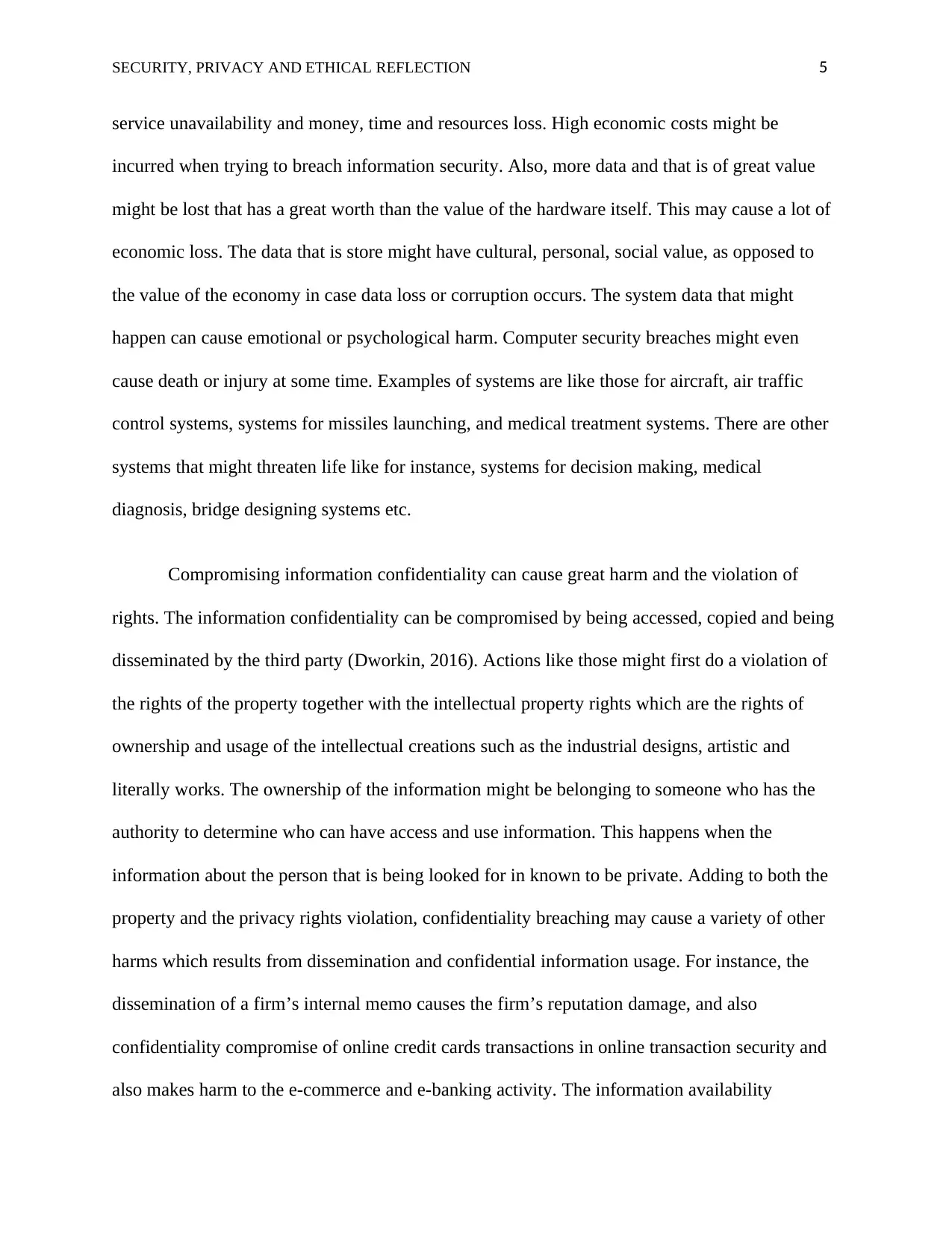
SECURITY, PRIVACY AND ETHICAL REFLECTION 5
service unavailability and money, time and resources loss. High economic costs might be
incurred when trying to breach information security. Also, more data and that is of great value
might be lost that has a great worth than the value of the hardware itself. This may cause a lot of
economic loss. The data that is store might have cultural, personal, social value, as opposed to
the value of the economy in case data loss or corruption occurs. The system data that might
happen can cause emotional or psychological harm. Computer security breaches might even
cause death or injury at some time. Examples of systems are like those for aircraft, air traffic
control systems, systems for missiles launching, and medical treatment systems. There are other
systems that might threaten life like for instance, systems for decision making, medical
diagnosis, bridge designing systems etc.
Compromising information confidentiality can cause great harm and the violation of
rights. The information confidentiality can be compromised by being accessed, copied and being
disseminated by the third party (Dworkin, 2016). Actions like those might first do a violation of
the rights of the property together with the intellectual property rights which are the rights of
ownership and usage of the intellectual creations such as the industrial designs, artistic and
literally works. The ownership of the information might be belonging to someone who has the
authority to determine who can have access and use information. This happens when the
information about the person that is being looked for in known to be private. Adding to both the
property and the privacy rights violation, confidentiality breaching may cause a variety of other
harms which results from dissemination and confidential information usage. For instance, the
dissemination of a firm’s internal memo causes the firm’s reputation damage, and also
confidentiality compromise of online credit cards transactions in online transaction security and
also makes harm to the e-commerce and e-banking activity. The information availability
service unavailability and money, time and resources loss. High economic costs might be
incurred when trying to breach information security. Also, more data and that is of great value
might be lost that has a great worth than the value of the hardware itself. This may cause a lot of
economic loss. The data that is store might have cultural, personal, social value, as opposed to
the value of the economy in case data loss or corruption occurs. The system data that might
happen can cause emotional or psychological harm. Computer security breaches might even
cause death or injury at some time. Examples of systems are like those for aircraft, air traffic
control systems, systems for missiles launching, and medical treatment systems. There are other
systems that might threaten life like for instance, systems for decision making, medical
diagnosis, bridge designing systems etc.
Compromising information confidentiality can cause great harm and the violation of
rights. The information confidentiality can be compromised by being accessed, copied and being
disseminated by the third party (Dworkin, 2016). Actions like those might first do a violation of
the rights of the property together with the intellectual property rights which are the rights of
ownership and usage of the intellectual creations such as the industrial designs, artistic and
literally works. The ownership of the information might be belonging to someone who has the
authority to determine who can have access and use information. This happens when the
information about the person that is being looked for in known to be private. Adding to both the
property and the privacy rights violation, confidentiality breaching may cause a variety of other
harms which results from dissemination and confidential information usage. For instance, the
dissemination of a firm’s internal memo causes the firm’s reputation damage, and also
confidentiality compromise of online credit cards transactions in online transaction security and
also makes harm to the e-commerce and e-banking activity. The information availability
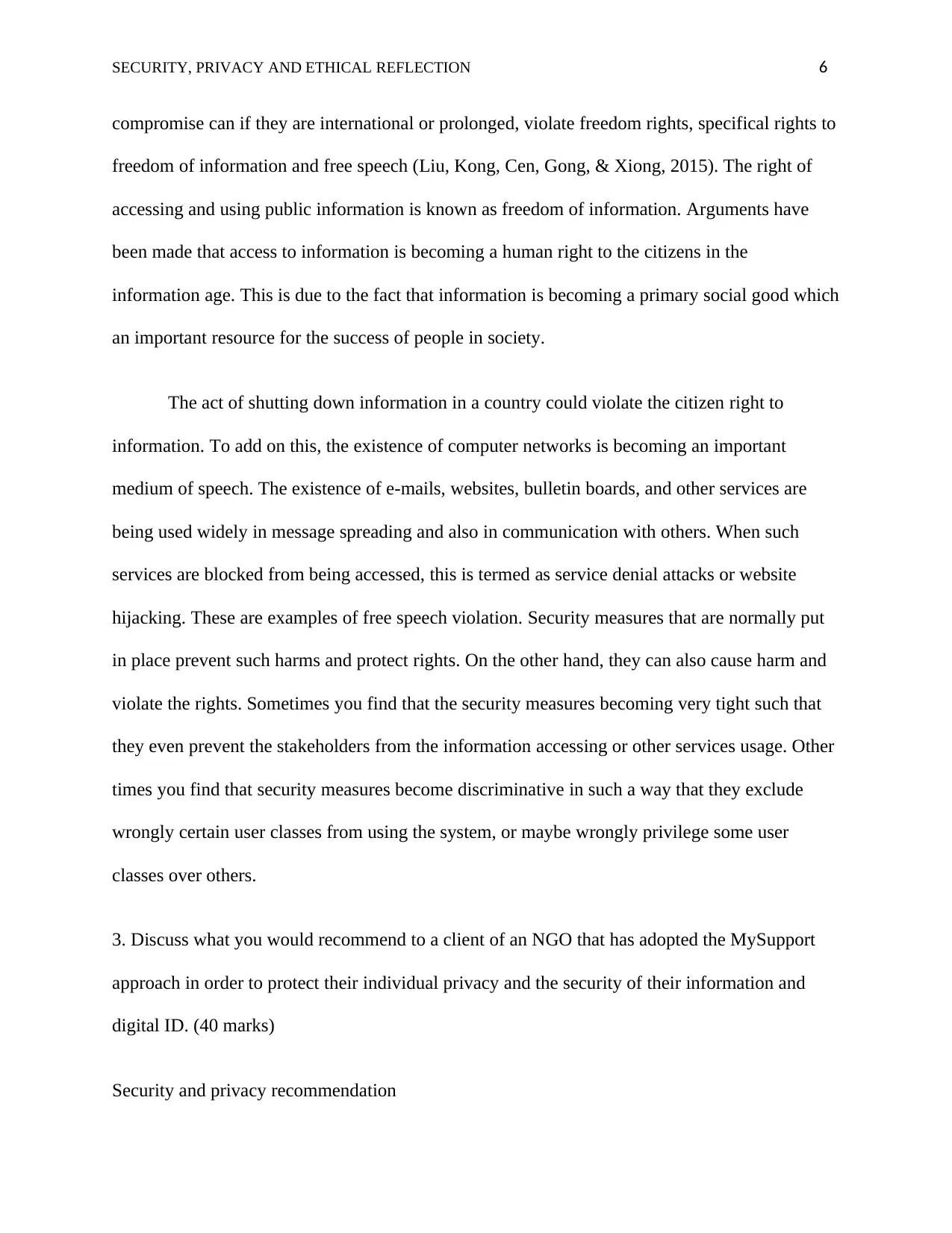
SECURITY, PRIVACY AND ETHICAL REFLECTION 6
compromise can if they are international or prolonged, violate freedom rights, specifical rights to
freedom of information and free speech (Liu, Kong, Cen, Gong, & Xiong, 2015). The right of
accessing and using public information is known as freedom of information. Arguments have
been made that access to information is becoming a human right to the citizens in the
information age. This is due to the fact that information is becoming a primary social good which
an important resource for the success of people in society.
The act of shutting down information in a country could violate the citizen right to
information. To add on this, the existence of computer networks is becoming an important
medium of speech. The existence of e-mails, websites, bulletin boards, and other services are
being used widely in message spreading and also in communication with others. When such
services are blocked from being accessed, this is termed as service denial attacks or website
hijacking. These are examples of free speech violation. Security measures that are normally put
in place prevent such harms and protect rights. On the other hand, they can also cause harm and
violate the rights. Sometimes you find that the security measures becoming very tight such that
they even prevent the stakeholders from the information accessing or other services usage. Other
times you find that security measures become discriminative in such a way that they exclude
wrongly certain user classes from using the system, or maybe wrongly privilege some user
classes over others.
3. Discuss what you would recommend to a client of an NGO that has adopted the MySupport
approach in order to protect their individual privacy and the security of their information and
digital ID. (40 marks)
Security and privacy recommendation
compromise can if they are international or prolonged, violate freedom rights, specifical rights to
freedom of information and free speech (Liu, Kong, Cen, Gong, & Xiong, 2015). The right of
accessing and using public information is known as freedom of information. Arguments have
been made that access to information is becoming a human right to the citizens in the
information age. This is due to the fact that information is becoming a primary social good which
an important resource for the success of people in society.
The act of shutting down information in a country could violate the citizen right to
information. To add on this, the existence of computer networks is becoming an important
medium of speech. The existence of e-mails, websites, bulletin boards, and other services are
being used widely in message spreading and also in communication with others. When such
services are blocked from being accessed, this is termed as service denial attacks or website
hijacking. These are examples of free speech violation. Security measures that are normally put
in place prevent such harms and protect rights. On the other hand, they can also cause harm and
violate the rights. Sometimes you find that the security measures becoming very tight such that
they even prevent the stakeholders from the information accessing or other services usage. Other
times you find that security measures become discriminative in such a way that they exclude
wrongly certain user classes from using the system, or maybe wrongly privilege some user
classes over others.
3. Discuss what you would recommend to a client of an NGO that has adopted the MySupport
approach in order to protect their individual privacy and the security of their information and
digital ID. (40 marks)
Security and privacy recommendation
⊘ This is a preview!⊘
Do you want full access?
Subscribe today to unlock all pages.

Trusted by 1+ million students worldwide
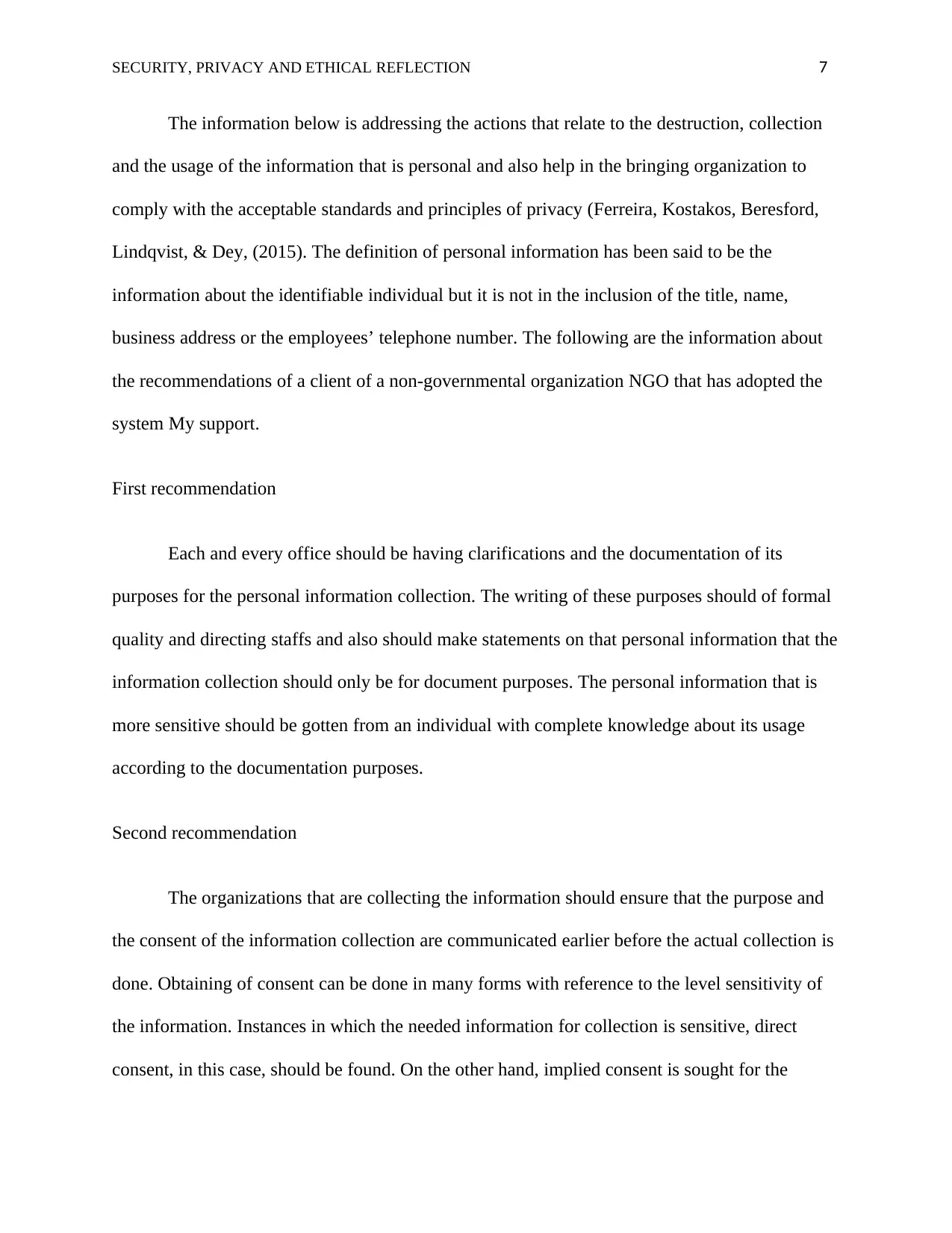
SECURITY, PRIVACY AND ETHICAL REFLECTION 7
The information below is addressing the actions that relate to the destruction, collection
and the usage of the information that is personal and also help in the bringing organization to
comply with the acceptable standards and principles of privacy (Ferreira, Kostakos, Beresford,
Lindqvist, & Dey, (2015). The definition of personal information has been said to be the
information about the identifiable individual but it is not in the inclusion of the title, name,
business address or the employees’ telephone number. The following are the information about
the recommendations of a client of a non-governmental organization NGO that has adopted the
system My support.
First recommendation
Each and every office should be having clarifications and the documentation of its
purposes for the personal information collection. The writing of these purposes should of formal
quality and directing staffs and also should make statements on that personal information that the
information collection should only be for document purposes. The personal information that is
more sensitive should be gotten from an individual with complete knowledge about its usage
according to the documentation purposes.
Second recommendation
The organizations that are collecting the information should ensure that the purpose and
the consent of the information collection are communicated earlier before the actual collection is
done. Obtaining of consent can be done in many forms with reference to the level sensitivity of
the information. Instances in which the needed information for collection is sensitive, direct
consent, in this case, should be found. On the other hand, implied consent is sought for the
The information below is addressing the actions that relate to the destruction, collection
and the usage of the information that is personal and also help in the bringing organization to
comply with the acceptable standards and principles of privacy (Ferreira, Kostakos, Beresford,
Lindqvist, & Dey, (2015). The definition of personal information has been said to be the
information about the identifiable individual but it is not in the inclusion of the title, name,
business address or the employees’ telephone number. The following are the information about
the recommendations of a client of a non-governmental organization NGO that has adopted the
system My support.
First recommendation
Each and every office should be having clarifications and the documentation of its
purposes for the personal information collection. The writing of these purposes should of formal
quality and directing staffs and also should make statements on that personal information that the
information collection should only be for document purposes. The personal information that is
more sensitive should be gotten from an individual with complete knowledge about its usage
according to the documentation purposes.
Second recommendation
The organizations that are collecting the information should ensure that the purpose and
the consent of the information collection are communicated earlier before the actual collection is
done. Obtaining of consent can be done in many forms with reference to the level sensitivity of
the information. Instances in which the needed information for collection is sensitive, direct
consent, in this case, should be found. On the other hand, implied consent is sought for the
Paraphrase This Document
Need a fresh take? Get an instant paraphrase of this document with our AI Paraphraser
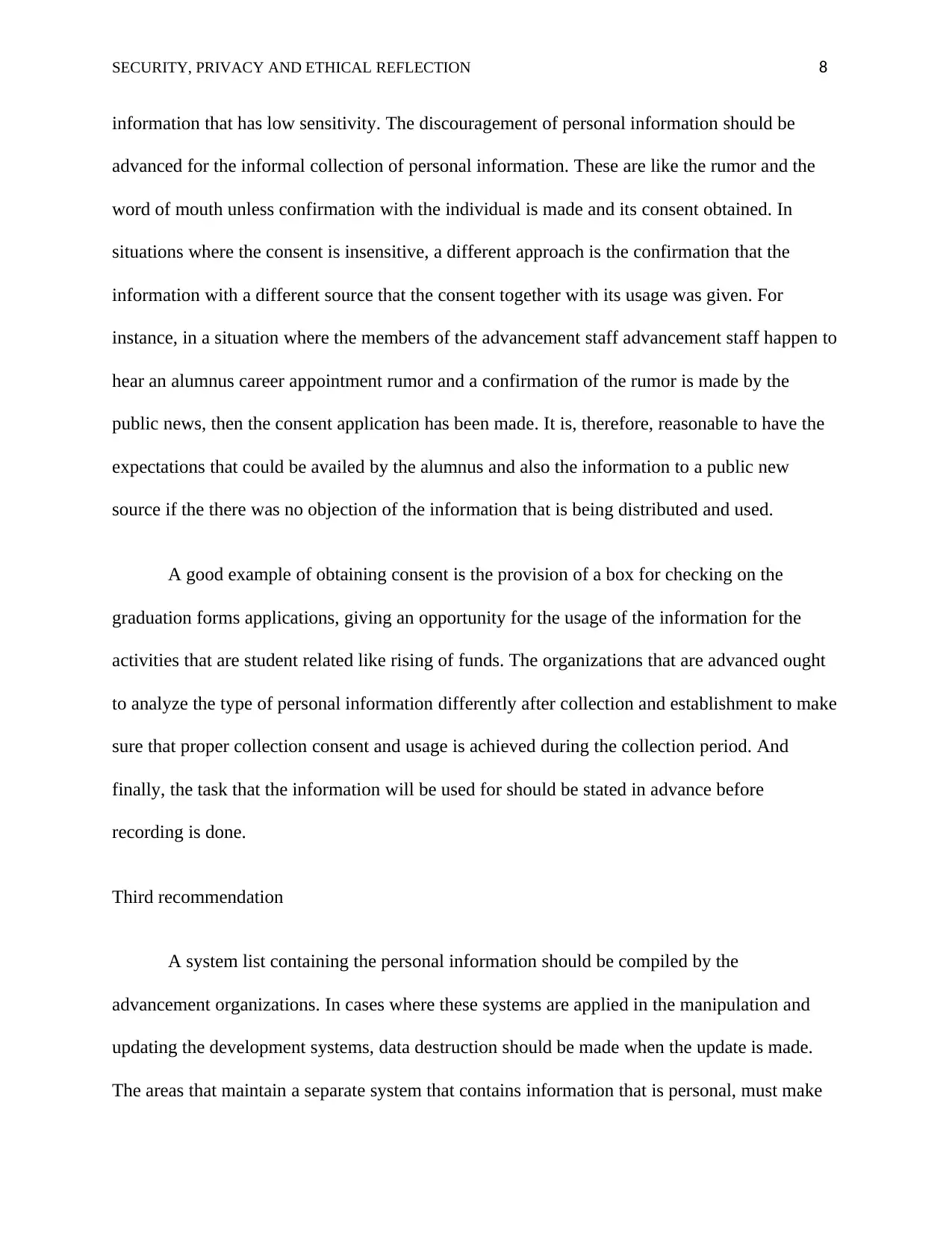
SECURITY, PRIVACY AND ETHICAL REFLECTION 8
information that has low sensitivity. The discouragement of personal information should be
advanced for the informal collection of personal information. These are like the rumor and the
word of mouth unless confirmation with the individual is made and its consent obtained. In
situations where the consent is insensitive, a different approach is the confirmation that the
information with a different source that the consent together with its usage was given. For
instance, in a situation where the members of the advancement staff advancement staff happen to
hear an alumnus career appointment rumor and a confirmation of the rumor is made by the
public news, then the consent application has been made. It is, therefore, reasonable to have the
expectations that could be availed by the alumnus and also the information to a public new
source if the there was no objection of the information that is being distributed and used.
A good example of obtaining consent is the provision of a box for checking on the
graduation forms applications, giving an opportunity for the usage of the information for the
activities that are student related like rising of funds. The organizations that are advanced ought
to analyze the type of personal information differently after collection and establishment to make
sure that proper collection consent and usage is achieved during the collection period. And
finally, the task that the information will be used for should be stated in advance before
recording is done.
Third recommendation
A system list containing the personal information should be compiled by the
advancement organizations. In cases where these systems are applied in the manipulation and
updating the development systems, data destruction should be made when the update is made.
The areas that maintain a separate system that contains information that is personal, must make
information that has low sensitivity. The discouragement of personal information should be
advanced for the informal collection of personal information. These are like the rumor and the
word of mouth unless confirmation with the individual is made and its consent obtained. In
situations where the consent is insensitive, a different approach is the confirmation that the
information with a different source that the consent together with its usage was given. For
instance, in a situation where the members of the advancement staff advancement staff happen to
hear an alumnus career appointment rumor and a confirmation of the rumor is made by the
public news, then the consent application has been made. It is, therefore, reasonable to have the
expectations that could be availed by the alumnus and also the information to a public new
source if the there was no objection of the information that is being distributed and used.
A good example of obtaining consent is the provision of a box for checking on the
graduation forms applications, giving an opportunity for the usage of the information for the
activities that are student related like rising of funds. The organizations that are advanced ought
to analyze the type of personal information differently after collection and establishment to make
sure that proper collection consent and usage is achieved during the collection period. And
finally, the task that the information will be used for should be stated in advance before
recording is done.
Third recommendation
A system list containing the personal information should be compiled by the
advancement organizations. In cases where these systems are applied in the manipulation and
updating the development systems, data destruction should be made when the update is made.
The areas that maintain a separate system that contains information that is personal, must make
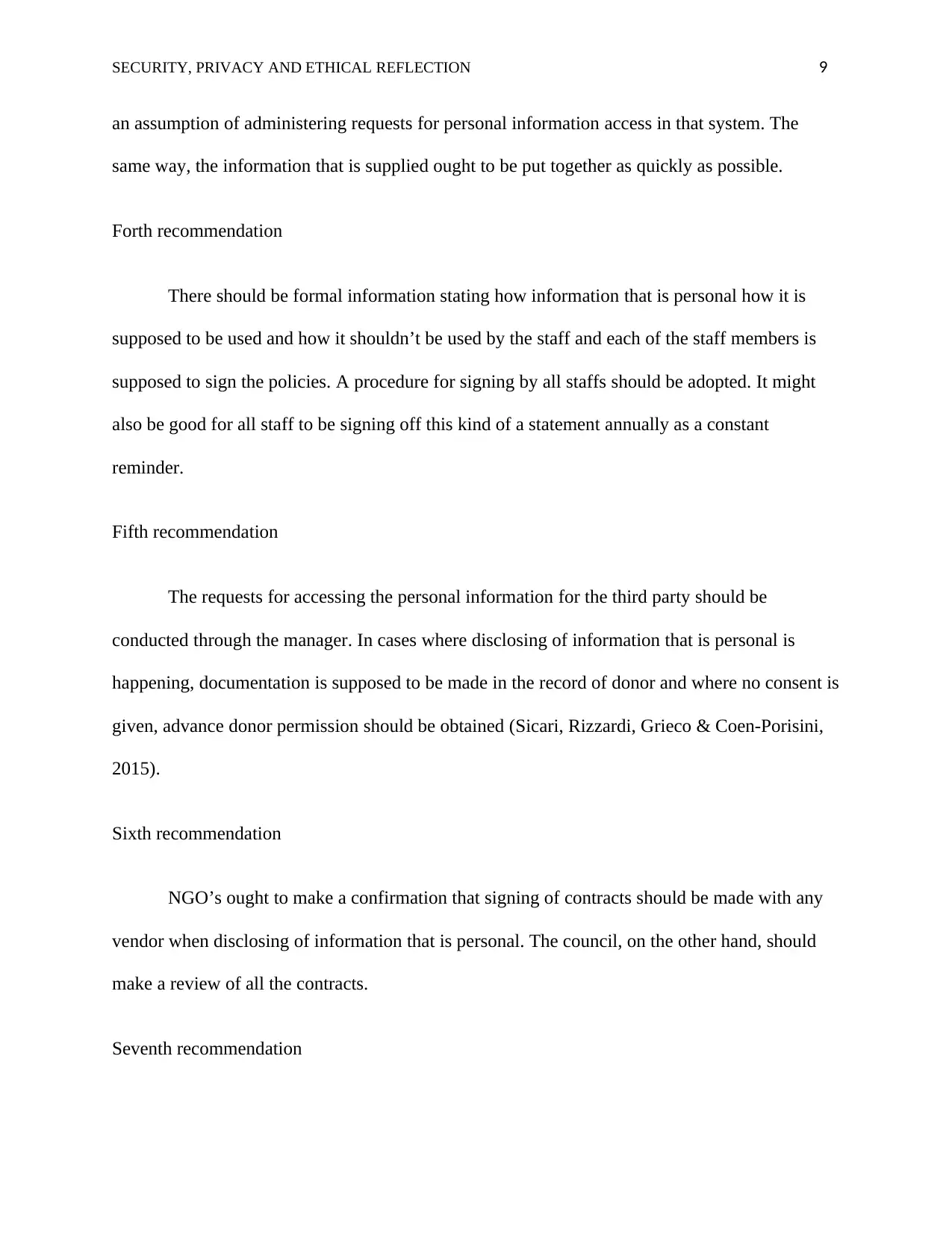
SECURITY, PRIVACY AND ETHICAL REFLECTION 9
an assumption of administering requests for personal information access in that system. The
same way, the information that is supplied ought to be put together as quickly as possible.
Forth recommendation
There should be formal information stating how information that is personal how it is
supposed to be used and how it shouldn’t be used by the staff and each of the staff members is
supposed to sign the policies. A procedure for signing by all staffs should be adopted. It might
also be good for all staff to be signing off this kind of a statement annually as a constant
reminder.
Fifth recommendation
The requests for accessing the personal information for the third party should be
conducted through the manager. In cases where disclosing of information that is personal is
happening, documentation is supposed to be made in the record of donor and where no consent is
given, advance donor permission should be obtained (Sicari, Rizzardi, Grieco & Coen-Porisini,
2015).
Sixth recommendation
NGO’s ought to make a confirmation that signing of contracts should be made with any
vendor when disclosing of information that is personal. The council, on the other hand, should
make a review of all the contracts.
Seventh recommendation
an assumption of administering requests for personal information access in that system. The
same way, the information that is supplied ought to be put together as quickly as possible.
Forth recommendation
There should be formal information stating how information that is personal how it is
supposed to be used and how it shouldn’t be used by the staff and each of the staff members is
supposed to sign the policies. A procedure for signing by all staffs should be adopted. It might
also be good for all staff to be signing off this kind of a statement annually as a constant
reminder.
Fifth recommendation
The requests for accessing the personal information for the third party should be
conducted through the manager. In cases where disclosing of information that is personal is
happening, documentation is supposed to be made in the record of donor and where no consent is
given, advance donor permission should be obtained (Sicari, Rizzardi, Grieco & Coen-Porisini,
2015).
Sixth recommendation
NGO’s ought to make a confirmation that signing of contracts should be made with any
vendor when disclosing of information that is personal. The council, on the other hand, should
make a review of all the contracts.
Seventh recommendation
⊘ This is a preview!⊘
Do you want full access?
Subscribe today to unlock all pages.

Trusted by 1+ million students worldwide
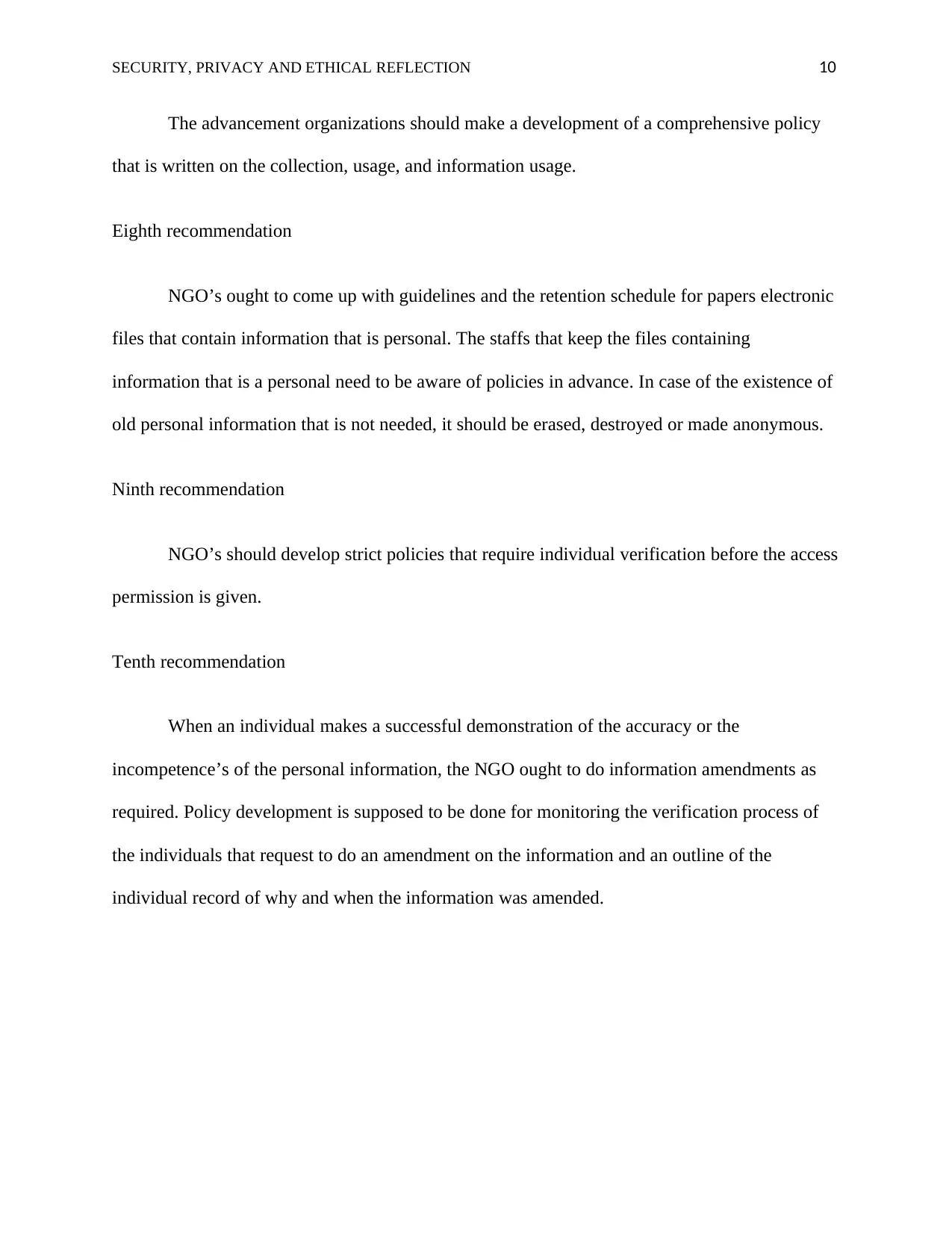
SECURITY, PRIVACY AND ETHICAL REFLECTION 10
The advancement organizations should make a development of a comprehensive policy
that is written on the collection, usage, and information usage.
Eighth recommendation
NGO’s ought to come up with guidelines and the retention schedule for papers electronic
files that contain information that is personal. The staffs that keep the files containing
information that is a personal need to be aware of policies in advance. In case of the existence of
old personal information that is not needed, it should be erased, destroyed or made anonymous.
Ninth recommendation
NGO’s should develop strict policies that require individual verification before the access
permission is given.
Tenth recommendation
When an individual makes a successful demonstration of the accuracy or the
incompetence’s of the personal information, the NGO ought to do information amendments as
required. Policy development is supposed to be done for monitoring the verification process of
the individuals that request to do an amendment on the information and an outline of the
individual record of why and when the information was amended.
The advancement organizations should make a development of a comprehensive policy
that is written on the collection, usage, and information usage.
Eighth recommendation
NGO’s ought to come up with guidelines and the retention schedule for papers electronic
files that contain information that is personal. The staffs that keep the files containing
information that is a personal need to be aware of policies in advance. In case of the existence of
old personal information that is not needed, it should be erased, destroyed or made anonymous.
Ninth recommendation
NGO’s should develop strict policies that require individual verification before the access
permission is given.
Tenth recommendation
When an individual makes a successful demonstration of the accuracy or the
incompetence’s of the personal information, the NGO ought to do information amendments as
required. Policy development is supposed to be done for monitoring the verification process of
the individuals that request to do an amendment on the information and an outline of the
individual record of why and when the information was amended.
Paraphrase This Document
Need a fresh take? Get an instant paraphrase of this document with our AI Paraphraser
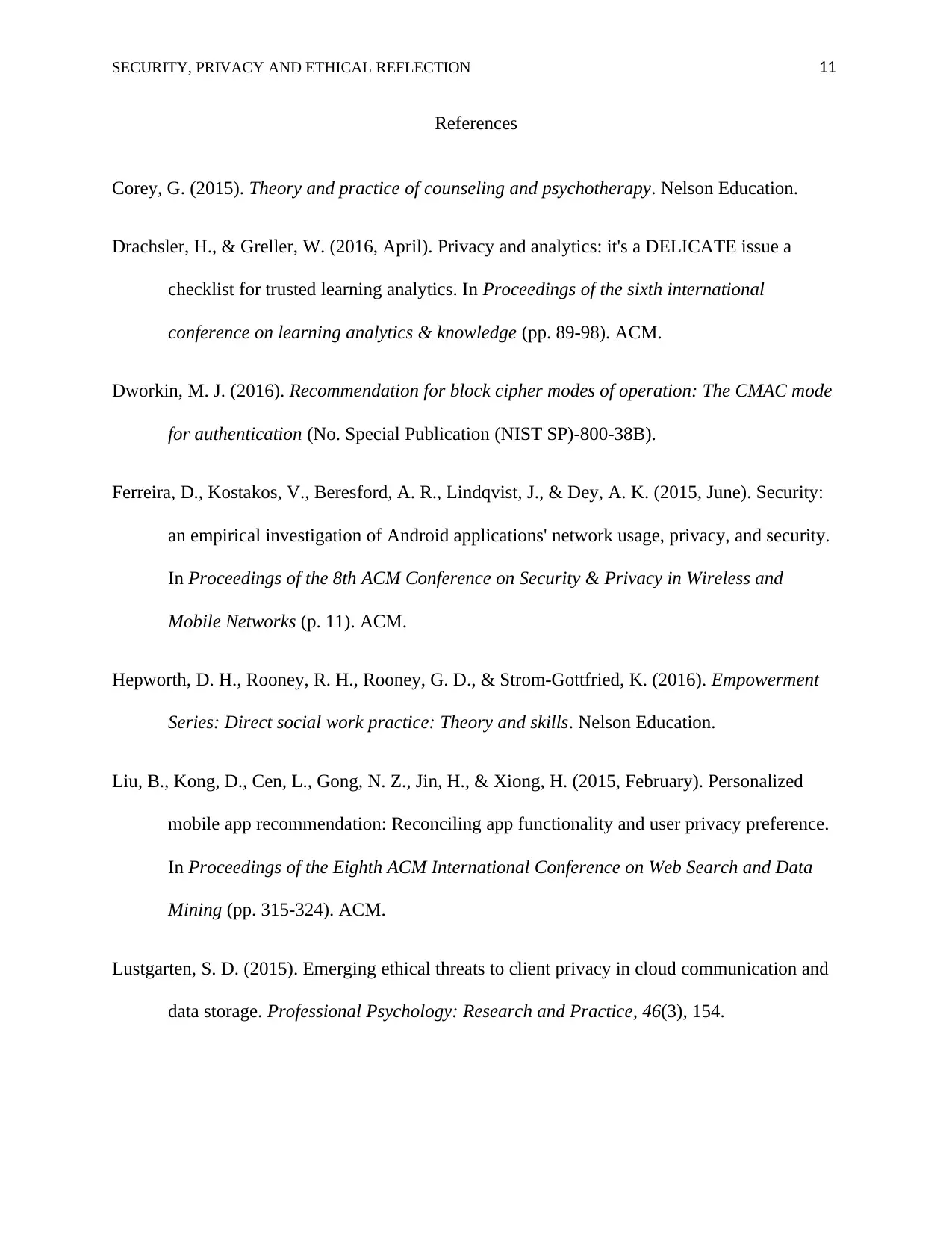
SECURITY, PRIVACY AND ETHICAL REFLECTION 11
References
Corey, G. (2015). Theory and practice of counseling and psychotherapy. Nelson Education.
Drachsler, H., & Greller, W. (2016, April). Privacy and analytics: it's a DELICATE issue a
checklist for trusted learning analytics. In Proceedings of the sixth international
conference on learning analytics & knowledge (pp. 89-98). ACM.
Dworkin, M. J. (2016). Recommendation for block cipher modes of operation: The CMAC mode
for authentication (No. Special Publication (NIST SP)-800-38B).
Ferreira, D., Kostakos, V., Beresford, A. R., Lindqvist, J., & Dey, A. K. (2015, June). Security:
an empirical investigation of Android applications' network usage, privacy, and security.
In Proceedings of the 8th ACM Conference on Security & Privacy in Wireless and
Mobile Networks (p. 11). ACM.
Hepworth, D. H., Rooney, R. H., Rooney, G. D., & Strom-Gottfried, K. (2016). Empowerment
Series: Direct social work practice: Theory and skills. Nelson Education.
Liu, B., Kong, D., Cen, L., Gong, N. Z., Jin, H., & Xiong, H. (2015, February). Personalized
mobile app recommendation: Reconciling app functionality and user privacy preference.
In Proceedings of the Eighth ACM International Conference on Web Search and Data
Mining (pp. 315-324). ACM.
Lustgarten, S. D. (2015). Emerging ethical threats to client privacy in cloud communication and
data storage. Professional Psychology: Research and Practice, 46(3), 154.
References
Corey, G. (2015). Theory and practice of counseling and psychotherapy. Nelson Education.
Drachsler, H., & Greller, W. (2016, April). Privacy and analytics: it's a DELICATE issue a
checklist for trusted learning analytics. In Proceedings of the sixth international
conference on learning analytics & knowledge (pp. 89-98). ACM.
Dworkin, M. J. (2016). Recommendation for block cipher modes of operation: The CMAC mode
for authentication (No. Special Publication (NIST SP)-800-38B).
Ferreira, D., Kostakos, V., Beresford, A. R., Lindqvist, J., & Dey, A. K. (2015, June). Security:
an empirical investigation of Android applications' network usage, privacy, and security.
In Proceedings of the 8th ACM Conference on Security & Privacy in Wireless and
Mobile Networks (p. 11). ACM.
Hepworth, D. H., Rooney, R. H., Rooney, G. D., & Strom-Gottfried, K. (2016). Empowerment
Series: Direct social work practice: Theory and skills. Nelson Education.
Liu, B., Kong, D., Cen, L., Gong, N. Z., Jin, H., & Xiong, H. (2015, February). Personalized
mobile app recommendation: Reconciling app functionality and user privacy preference.
In Proceedings of the Eighth ACM International Conference on Web Search and Data
Mining (pp. 315-324). ACM.
Lustgarten, S. D. (2015). Emerging ethical threats to client privacy in cloud communication and
data storage. Professional Psychology: Research and Practice, 46(3), 154.
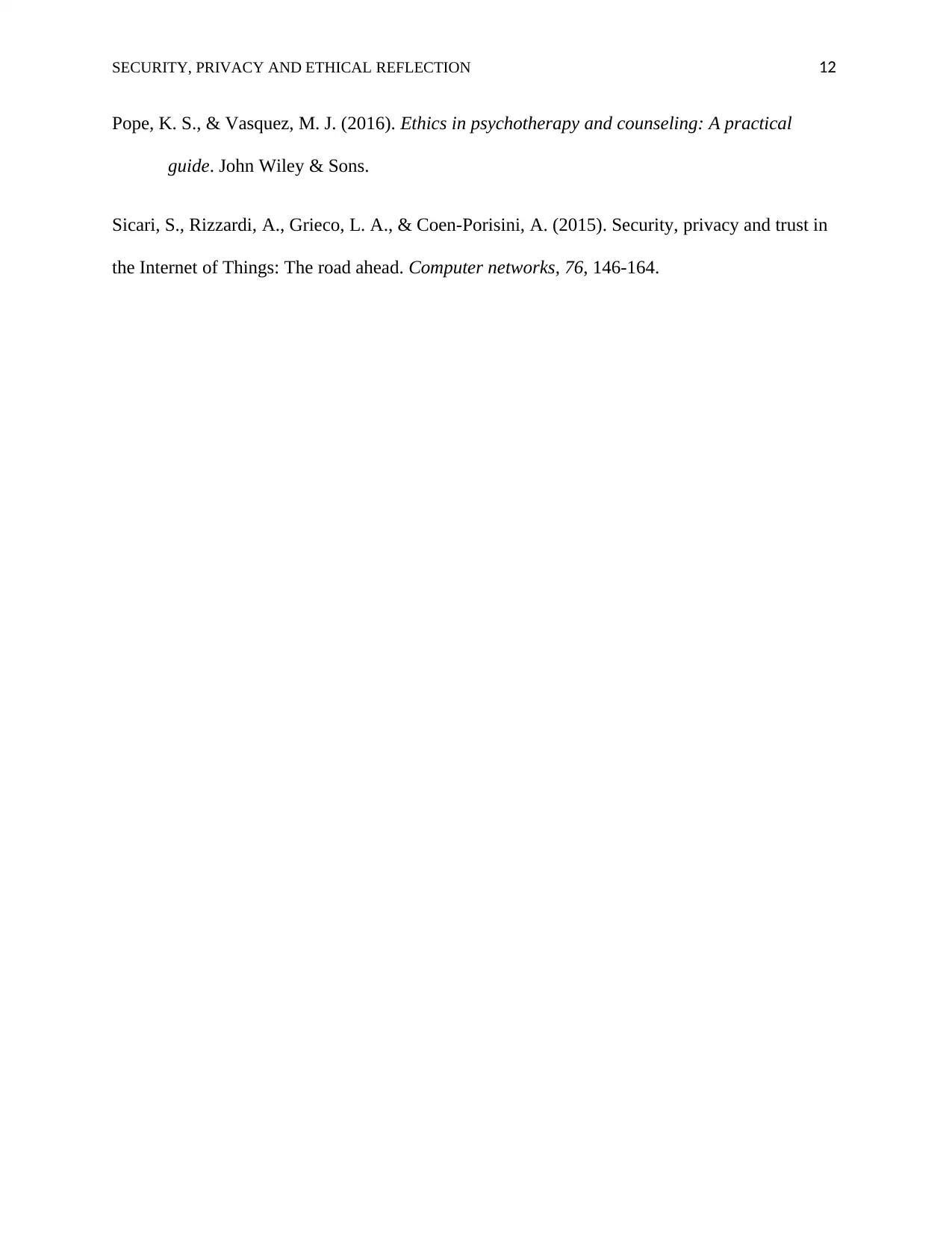
SECURITY, PRIVACY AND ETHICAL REFLECTION 12
Pope, K. S., & Vasquez, M. J. (2016). Ethics in psychotherapy and counseling: A practical
guide. John Wiley & Sons.
Sicari, S., Rizzardi, A., Grieco, L. A., & Coen-Porisini, A. (2015). Security, privacy and trust in
the Internet of Things: The road ahead. Computer networks, 76, 146-164.
Pope, K. S., & Vasquez, M. J. (2016). Ethics in psychotherapy and counseling: A practical
guide. John Wiley & Sons.
Sicari, S., Rizzardi, A., Grieco, L. A., & Coen-Porisini, A. (2015). Security, privacy and trust in
the Internet of Things: The road ahead. Computer networks, 76, 146-164.
⊘ This is a preview!⊘
Do you want full access?
Subscribe today to unlock all pages.

Trusted by 1+ million students worldwide
1 out of 12
Related Documents
Your All-in-One AI-Powered Toolkit for Academic Success.
+13062052269
info@desklib.com
Available 24*7 on WhatsApp / Email
![[object Object]](/_next/static/media/star-bottom.7253800d.svg)
Unlock your academic potential
Copyright © 2020–2026 A2Z Services. All Rights Reserved. Developed and managed by ZUCOL.





